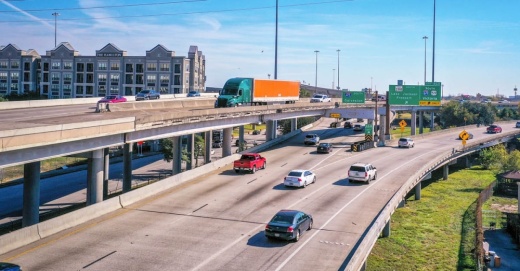The Texas Department of Transportation’s Transportation Commissioner Laura Ryan said the agency was confident that agreements could be reached with Harris County and the Federal Highway Administration over the controversial I-45 widening project.
Ryan’s comments came at a luncheon hosted by the North Houston Association, a regional nonprofit business association. Harris County Precinct 3 Commissioner Tom Ramsey, who voted against the county's initial lawsuit against TxDOT, moderated the conversation with Ryan.
Ryan said the Federal Highway Administration, which opened an investigation into possible violations of the Civil Rights Act in October, was open to a “voluntary resolution agreement.” That agreement would allow some modifications to the design but the purpose of the project would not change. Ryan did not clarify which aspects of the design would be modified.
Ryan also reiterated TxDOT’s efforts to involve the public in meetings and argued that most of the issues raised have already been incorporated into the planned expansion. Groups such as Stop TxDOT I-45 have raised concerns about the project’s projected displacement of over 1,000 homes in Harris County.
Air Alliance Houston, Stop TxDOT I-45, Link Houston, Texas Appleseed and Texas Housers filed a Dec. 16 Civil Rights Act complaint against the project, alleging intentional racial discrimination and that the agency had violated established procedures in moving forward with the project.
Ryan did not comment on the Dec. 16 suit.
Infrastructure funding timeline still unclear
Ryan also said TxDOT is still waiting on the timeline for funding to flow from the federal Infrastructure Investment and Jobs Act signed in November, citing rulemaking processes as a reason for delays.
TxDOT estimated about $28 billion will arrive to the state over five years. The vast majority of the funds will go to surface transportation such as roads and bridges.
Ryan highlighted new grant programs available for application that would fund electric vehicle charging stations as well as the Protect program, which grants $8.7 billion to boost resilience for transportation systems, including upgrading existing infrastructure and strengthening evacuation routes.





